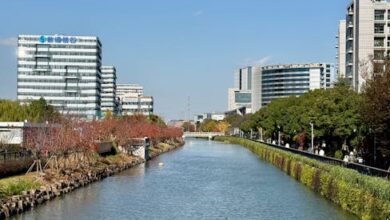The Unlikely Diplomatic Corps: Tech Titans Step Up

In a world often defined by stark political divides and the sometimes-blunt instrument of federal power, a recent revelation offered a surprisingly nuanced turn of events. Picture this: plans are afoot for the federal government to potentially deploy National Guard troops to a major American city, San Francisco. The stage is set for a contentious showdown, a move that often sparks debate about local autonomy versus national intervention. But then, an unexpected intervention changed the course of action entirely, not from another political figure, but from two titans of the tech world: Salesforce CEO Marc Benioff and Nvidia CEO Jensen Huang.
Former President Donald Trump, in a candid moment, credited these two tech luminaries for his decision to scrap plans to “surge” federal forces into the Bay Area. Mayor Daniel Lurie of San Francisco confirmed the plan’s cancellation, adding another layer of intrigue to a story that feels less like a typical political maneuver and more like a scene from a modern-day civic drama. This wasn’t a back-room deal for corporate favors; it was about the very fabric of a city, and the willingness of powerful individuals to step into a volatile situation. It begs the question: What does it mean when the fate of urban stability rests, even partially, on the persuasive power of tech’s elite?
The Unlikely Diplomatic Corps: Tech Titans Step Up
The image of Marc Benioff and Jensen Huang, more accustomed to boardrooms and innovation labs than political negotiations, engaging directly with a former President over troop deployments is, to say the least, striking. Both are household names in the tech world, albeit for different reasons, and their joint intervention speaks volumes about their perceived stake in San Francisco’s well-being.
Marc Benioff, the charismatic co-founder and CEO of Salesforce, is no stranger to civic engagement. He’s a prominent figure in San Francisco’s philanthropic and social scenes, often outspoken on local issues ranging from homelessness to public education. Salesforce, after all, is deeply embedded in the city’s economic and cultural landscape, employing thousands and occupying some of its most iconic skyline real estate. For Benioff, the health and stability of San Francisco aren’t just abstract concepts; they’re directly tied to his company’s success, its brand image, and the quality of life for his employees.
Jensen Huang, on the other hand, the visionary leader behind Nvidia, is less overtly political. Nvidia, the chip-making giant that has become central to the AI revolution, operates with a different public persona. Yet, Huang’s involvement underscores the depth of concern. Nvidia, too, has significant operations and employees in the Bay Area. Their combined economic footprint in the region is immense. When leaders of this caliber speak, particularly on an issue directly impacting the stability of their operational base and the safety of their workforce, their words carry significant weight.
More Than Just Profit: The Evolving Role of Corporate Leadership
This episode highlights a growing trend: corporate leaders are increasingly expected, or even feel compelled, to take stands on social and political issues that extend far beyond their immediate business interests. It’s no longer enough to simply create jobs and generate profit. Companies and their CEOs are seen as integral parts of the communities they inhabit, with a responsibility to contribute to the common good.
For Benioff and Huang, an influx of federal troops could have been perceived as a highly destabilizing event for San Francisco. It risked escalating tensions, damaging the city’s reputation, and potentially impacting the talent pool and quality of life for their employees. Their intervention wasn’t about a quarterly earnings report; it was about protecting their city, their people, and the broader ecosystem that allows their companies to thrive. This type of civic engagement is a powerful reminder that the lines between business, politics, and community well-being are more blurred than ever before.
The Federal-Local Friction and a Narrow Escape
The backdrop to this story is the perennial tension between federal and local governance. San Francisco, like many major U.S. cities, has faced its share of challenges – from homelessness and drug epidemics to concerns about public safety and property crime. These issues often become fodder for national political discourse, with some federal voices advocating for more assertive intervention in local affairs.
The very idea of a “surge” of federal troops into a city implies a lack of control, a breakdown of local authority, and often, a confrontational approach. For Mayor Daniel Lurie and other local leaders, such a move would likely have been viewed as an overreach, undermining local governance and potentially exacerbating rather than resolving issues. Cities prefer to handle their own problems, leveraging local resources and community-specific solutions, rather than having a federal presence that can feel like an occupation.
In this context, Benioff and Huang’s intervention provided a critical off-ramp. They offered an alternative narrative, a different perspective that allowed for a de-escalation of what could have been a highly charged situation. Their voices, steeped in the economic realities and future potential of San Francisco, likely provided a perspective that purely political arguments might have lacked.
The Power of Persuasion: What Changed Minds?
What exactly did Benioff and Huang say? While the specifics remain private, one can speculate on the nature of their arguments. Did they emphasize the economic damage a federal presence could inflict? Did they highlight the unique challenges and ongoing efforts within San Francisco, suggesting that local solutions were paramount?
It’s plausible they appealed to Trump’s business acumen, framing the stability of San Francisco as crucial for the nation’s tech economy. Perhaps they argued that a visible federal troop presence would be counterproductive, creating negative optics and potentially alienating the very innovators and businesses critical to the country’s economic future. When highly successful business figures, whom Trump often admires, speak on matters of urban stability and economic health, their words can resonate differently than those from political opponents.
The influence of these tech leaders provided a politically palatable way for the former President to pivot. Instead of a contentious federal deployment, the story became about a dialogue with influential leaders, leading to a thoughtful adjustment of plans. It’s a classic example of how diplomacy, even in unexpected forms, can avert conflict.
A Glimpse into the Future of Civic Engagement?
This incident offers a fascinating glimpse into the evolving landscape of power and influence. In an era where tech companies are not just economic powerhouses but also cultural touchstones, the leaders at their helm are increasingly recognized for their societal impact. Their ability to directly influence federal decisions on local matters suggests a shift in how civic engagement might operate in the future.
On one hand, it’s heartening to see powerful individuals using their influence to advocate for what they believe is best for their communities, preventing potential conflict and promoting stability. It demonstrates that dialogue and persuasion, even across political divides, can lead to positive outcomes. On the other hand, it raises questions about the appropriate role of unelected business leaders in shaping public policy and security decisions. While their intentions here appear to have been positive, it highlights the immense, and sometimes opaque, influence wielded by the private sector.
Ultimately, the story of Trump, Benioff, and Huang is more than just a political footnote. It’s a testament to the complex interplay of power, the surprising avenues through which influence flows, and the ever-expanding definition of civic responsibility in our interconnected world. It reminds us that solutions, and sometimes prevention of escalation, can emerge from the most unexpected of conversations.





